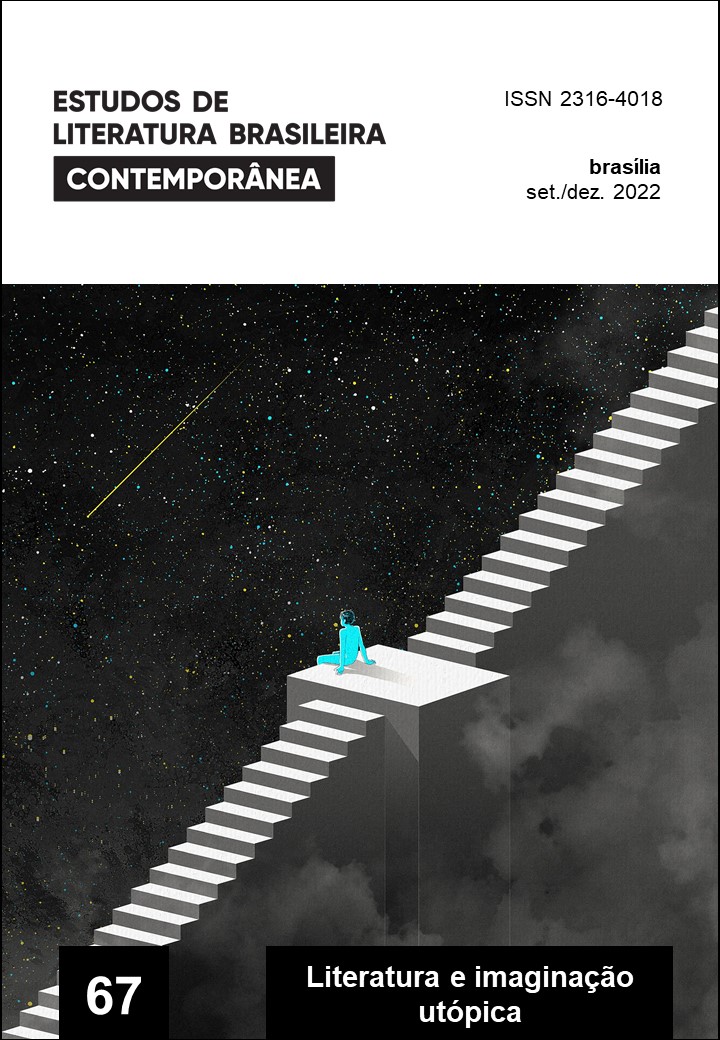“This is going to be chaos!”: dystopia and authoritarianism in Namíbia, não!
Keywords:
dystopia; authoritarianism; space; Namíbia, não! ; Aldri AnunciaçãoAbstract
This article analyzed how the narrative of Namíbia, Não!, a theatrical text by the actor and director Aldri Anunciação, from Bahia, Brazil, elaborates a dystopian universe in which the intersection of temporalities exposes contradictions of the past, broadens the perception of racial violence in the present and holds projections of future in which hostility and interdictions materialize in space. For this purpose, it uses contributions from intellectuals such as Grada Kilomba, in Memórias da Plantação: episódios de racismo cotidiano (2019), by Abdias do Nascimento, in Teatro Experimental do Negro: trajetória e reflexões (2004), by Leda Maria Martins, in Como respirar? (2020), and Gregory Clayes, in Dystopia: A Natural History. A study of modern despotism, its antecedents, and its literary diffractions (2017).
Downloads
References
ANUNCIAÇÃO, Aldri (2020). Trilogia do confinamento: Namíbia não!, Embarque imediato, O campo de batalha. São Paulo: Perspectiva.
CLAEYS, Gregory (2017). Dystopia: a natural history. A study of modern despotism, its antecedents, and its literary diffractions. Oxford: Oxford University Press.
KILOMBA, Grada (2019). Memórias da plantação: episódios de racismo cotidiano. Tradução de Jess Oliveira. Rio de Janeiro: Cobogó.
MARTINS, Leda Maria (2020). Como respirar? In: ANUNCIAÇÃO, Aldri. Trilogia do confinamento: Namíbia não!, Embarque imediato, O campo de batalha. São Paulo: Perspectiva. p. 11-25.
NASCIMENTO, Abdias do (2004). Teatro Experimental do Negro: trajetória e reflexões. Estudos Avançados, v. 18, n. 50, p. 209-224. https://doi.org/10.1590/S0103-40142004000100019» https://doi.org/10.1590/S0103-40142004000100019
Downloads
Published
How to Cite
Issue
Section
License

This work is licensed under a Creative Commons Attribution-NoDerivatives 4.0 International License.
Authors who publish in this journal agree to the following terms:
a) The authors maintain the copyright and grant the journal the right of first publication, the work being simultaneously licensed under the Creative Commons Attribution License-Non Commercial 4.0 which allows the sharing of the work with acknowledgment of the authorship of the work and publication this journal.
b) Authors are authorized to enter into additional contracts separately, for non-exclusive distribution of the version of the work published in this journal (eg publish in institutional repository or as a book chapter), with authorship recognition and publication in this journal.
c) Authors are allowed and encouraged to publish and distribute their work online (eg in institutional repositories or on their personal page) after the editorial process, as this can generate productive changes, as well as increase the impact and citation of published work (See The Effect of Free Access).
d) The authors of the approved works authorize the magazine to, after publication, transfer its content for reproduction in content crawlers, virtual libraries and the like.
e) The authors assume that the texts submitted to the publication are of their original creation, being fully responsible for their content in the event of possible opposition by third parties.


